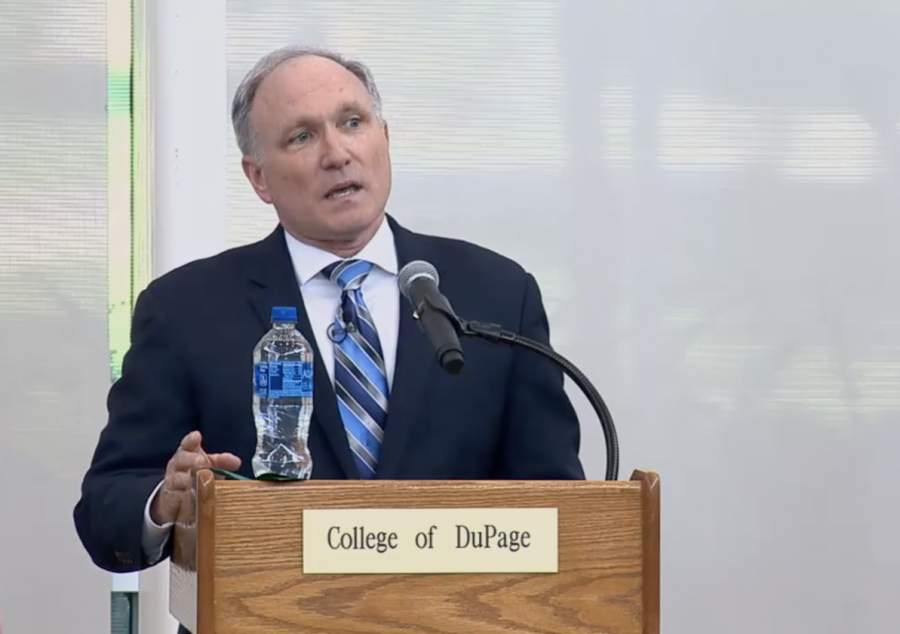Interim President Brian Caputo speaks at Presidential Search Committee Open Forum
May 21, 2019
After withdrawing as a candidate for the full-time position two weeks ago, Interim COD President Brian Caputo had little to say about re-submitting his name following a special plea from the board of trustees. During an open forum, Caputo cited a personal issue that was resolved. Caputo spoke at the College of DuPage Presidential Committee open forum on May 16 in the SSC atrium. Caputo, the current interim president, has 35 years of experience in management and leadership. Prior to his role as interim president, he was the vice president of Administrative Affairs and treasurer at COD.
Caputo believes this can be a time of rebirth at the college.
“Why do I believe that? Because I see opportunities for us that we can take advantage of,” Caputo said. In February, a group of us met with federal legislators who asked us to look at how we can deliver value in a couple of areas. One of them is STEM, and one of those is workforce development. More broadly, the appeal was how can you as a community college fill a need? I believe we can fill that need because I think we can adapt to our environment, and the public is looking for us to deliver value, for higher education to deliver value. I think we are very well positioned to do that, and I believe in what you can contribute,” Caputo said.
He, as well as a group of faculty are working on a new STEM facility. $400,000 has been added to the 2020 budget to create this facility on the third floor of the Berg Instructional Center.
Caputo also has high hopes for the college in terms of student success.
“I want us to be on track for being the most effective in student success in the state of Illinois, along those guidelines, and in the top 10% nationally. I believe that Guided Pathways, what we are doing right now is a way of getting there, but it’s not only Guided Pathways. It’s what you do to make that happen,” Caputo said.
Students and faculty members have expressed their concern about Guided Pathways not giving students enough options in terms of classes.
“I would just ask that you consider that when students take classes that they don’t need, or unknowingly take classes that they don’t need, those are resources that are not available for other things. In the case of some of our students, that is taking the shoes off their kids’ feet, or taking away other things that they need. So we need to be mindful of that. And that’s not to say that a student can’t take a class that’s off of a map.But if they do that they need to know what they’re doing, and they need to be told that you can take this class, but it is going to delay your graduation and delay your objective. Caputo hopes the software used with the Guided Pathways program will give students a variety of different courses to choose from.
“The liberal arts will always be be important, and as I spoke at the state of the college address just a week or so ago, I acknowledged with the community leaders that’s what you need.
With the success of the MAC, Caputo sees it as a way to provide art and cultural experiences to DuPage county.
“I want us to be a recognized, THE recognized provider for art and culture for the western suburbs. The MAC we have now is a true gem. Frida Kahlo give us opportunities. We are expanding the [Cleve Carney] gallery; we just got approved for that. One thousand square feet on the northern end of the gallery to provide more capacity for that exhibit. But that is just the beginning,” Caputo said.
With this expansion, the MAC will be able to host other exhibits on the same caliber as the Frida Kahlo exhibit.
Reflecting on his time as Interim President, Caputo named his achievements.
“As interim president, I took over in January, I have not been a caretaker Interim President. I’ve continued to move the college forward in student success, Guided Pathways, STEM, education facilities planning, financial management and advancement as well as fundraising. I have sought to cultivate a culture of openness,” Caputo said.
When asked about students being dropped for non-payment, it is an ongoing issue.
“We only drop students up through the last drop date for the 16-week term, so that means the 12-week (students) essentially don’t get dropped, and the first eight don’t get dropped. With that rule that we have right now, that was developed based on a collaborative effort between the administration and the shared governance council. We thought we nailed that one. Apparently we haven’t. So what we have done is we’ve created another group made up of administrators, faculty and others that are going to study the issue. There may be a better solution. What we need to be careful of is that at one point we had literally $5 million of receivables on our books because we really didn’t manage this very well. So there’s got to be a more palatable solution between $5 million in the hole and perhaps where we are now. We will see what comes out of that, but I think we will come up with something that suits the need without being irresponsible,” Caputo said.




















